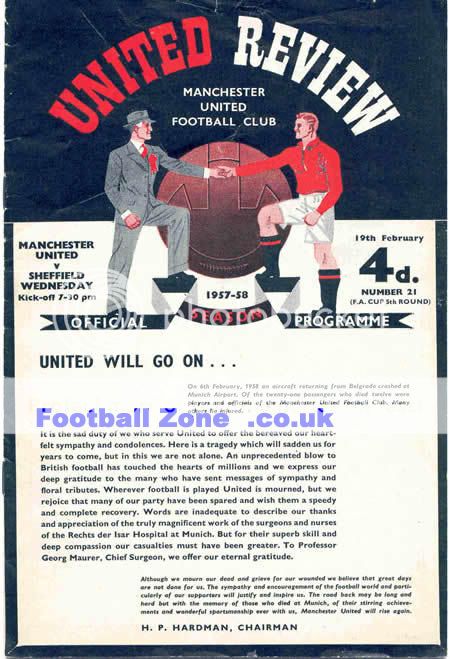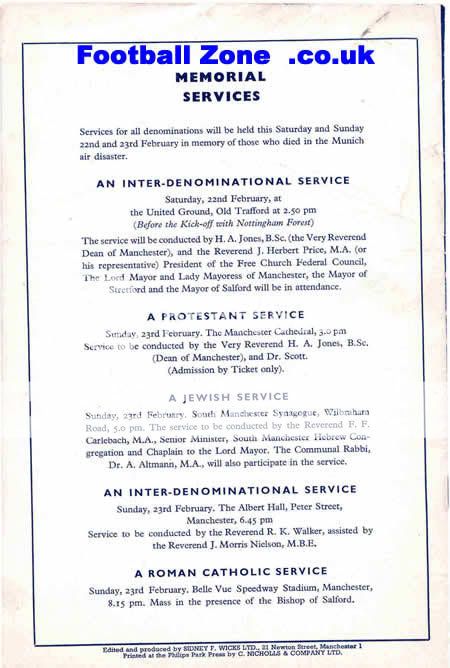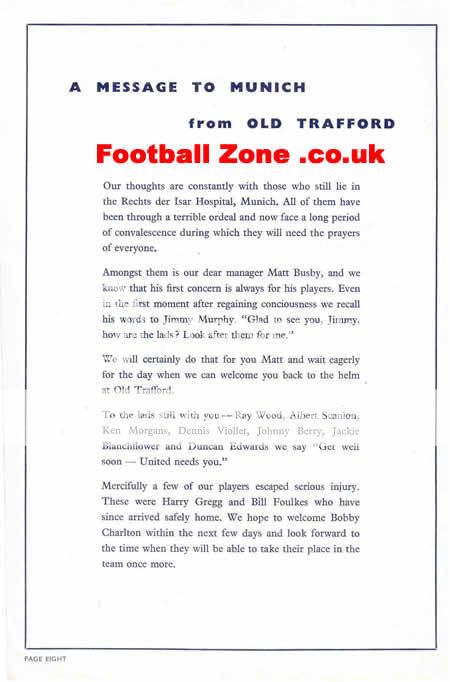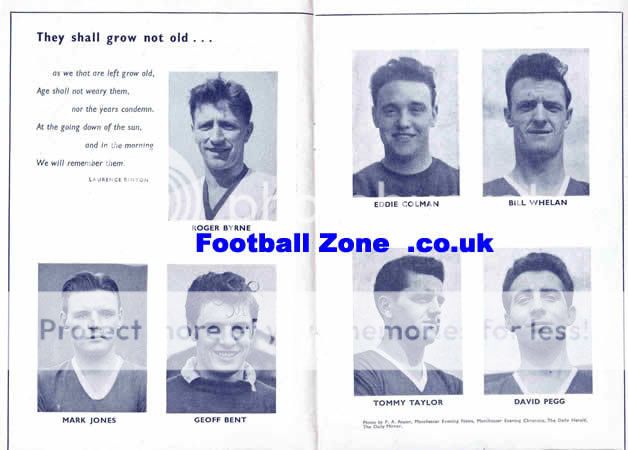TomClare
Full Member
As I told you all yesterday, as you get to our age and become an "old fart"; you do get a lot of time for reflection; and obviously a lot of it is about our time following Manchester United. It's commonly accepted that during Sir Matt's tenure at Old Trafford, three great teams graced that hallowed turf, and gave us all so much pleasure. When Sir Matt took over the mantle of manager in 1945, there was already some really good players at the club; namely Johnny Carey, Jack Rowley, Stan Pearson, Henry Cockburn, John Aston, Allenby Chilton, Jack Crompton. Over the next 7 years he moulded them into a really good team; one that won the F.A. Cup in a classic Final against Blackpool, in 1948, and then culminated with the winning of the 1st Division Championship in the 1951/52 season - their first Championship since 1910-11.
By the time that Championship had been won, Sir Matt had already put into place his youth policy. Youngsters such as Mark Jones, David Pegg, Albert Scanlon, Duncan Edwards, Jeff Whitefoot, Bill Foulkes, Eddie Lewis, Jackie Blanchflower, and Denis Viollet were already starting to make their mark. The season after that Championship, age had started to tell on a number of the first team players. It was only natural - so many of them had been deprived of six years of their careers by a small matter of the Second World War. Most of them were over 30 years of age, and some well into their late 30’s. The team didn't start so well in the 1952/53 season, and in the January of 1953, went out of the F.A. Cup by 5-3 at Turf Moor, Burnley. The Board of Directors became a little anxious, and one or two of them voiced their concerns at a Board Meeting. Sir Matt became annoyed, and told them that he had players on the books that in his opinion, were worth well over 250,000 pounds - an astronomical amount of money at that time. He did in fact threaten to resign if there was any interference with his youth policy. There was a lot of criticism of him in the press, but it was like water off a duck's back. Together with his trusted right hand man, Jimmy Murphy, his able lieutenants Bert Whalley, Tom Curry, and Billy Inglis, plus his wonderful Chief Scout, Joe Armstrong, he quietly got on with bringing the youngsters on, schooling them in the right way, and watched them as they grew stronger, and stronger. As the seeds of the vines that he had planted grew, they began to bear a rich flavoured fruit, and each team throughout the Club, from Juniors through to First Team, became a formidable unit.
The Youth team were unbeatable, and were such an attractive team to watch, that crowds of 30,000 were not uncommon at their games, which were played either on a Wednesday afternoon, or a Saturday morning. The Juniors who played in the local league used to win games by huge margins playing against opponents that were much older than themselves. The 'A' and 'B' teams won their leagues, the Reserves won the Central League, and crowds of 10,000 or more were again, not uncommon at those reserve team games. The imaginations of the public were captured by these young, gifted players, and the football which they were playing. In '52/53 the 1st team had finished 8th, in '53/54 it was 4th, and in '54/55 it was 4th again. However, in 1955/56, the vine finally bore the fruit that they had been waiting for. This bunch of young kids romped to their first Championship, and did it so convincingly by a margin of 11 points, and with an average age of just 22 years. That was unheard of back then. The following season they retained their title and scored over 100 league goals for the first time in the Club's history. They also reached the F.A. Cup Final, losing narrowly to Aston Villa by 2-1 after playing 84 minutes of the game with no goalkeeper.
It was also the season which saw them fire the country's imagination by becoming the first English team to compete in the European Cup. The whole Club was thriving, and Sir Matt's dream was being realised. The future was bright, and it seemed nothing could stop them attaining their highest dreams - they were a remarkable young team, and even more, were a remarkable bunch of young men. History tells us now, that cruelly, their dreams were never to be fulfilled.
Between the years of 1958-1963, there was a lot of movement of players both into, and out of Old Trafford. The Munich tragedy had taken its toll, and in 1962-63, the Club were almost relegated, finishing 19th in Division 1. However, for all of that lowly position, the team was nowhere near as bad as the press made them out to be. There was games where they did fire on all cylinders, and were a joy to behold. The F.A. Cup seemed to spur them into another gear, and they reached the Final beating the much fancied Leicester City 3-1 at Wembley, with vintage performances from two Scotsmen, Paddy Crerand. and Denis Law. Denis had joined the previous August after an unhappy spell in Italy, and Paddy had come south from Celtic in January of '63. In September of 1958, Sir Matt had made Albert Quixall the costliest player in Britain by signing him from Sheffield Wednesday for 45,000 pounds. In 1960 he signed the tough tackling Maurice Setters from West Bromwich Albion; In 1961 came David Herd from Arsenal, and Noel Cantwell from West Ham. Six of the 1963 Cup winning team had been bought in - Cantwell, Crerand, Setters, Quixall, Herd, and Law. Busby had used his buying powers wisely, whilst quietly sowing the seeds of his youth policy once again. In 1964 the Youth team once again brought home the F.A. Youth Cup, the first time since the days of the "Babes."
In September of that '63/64 season, a young Irish winger made his debut in the first team - a waif of a boy named Georgie Best. Little were we to know that September day, just what an impact the young George was going to have on the game in the years to come. Also in that Youth Cup winning team were Jimmy Rimmer, Bobby Noble, David Sadler, John Fitzpatrick, and John Aston. In 1964/65 the Championship came home again for the first time since Munich, and again in 1966/67. The team played a bright attacking style of football and were a joy to watch, especially Best, Charlton, and Law - three players who were all named European Footballer of the Year during that period. The climax of the 1967/68 season saw United pipped for the Champions by arch enemies, but near neighbours, Manchester City. However, their achievement was eclipsed by the realisation of Sir Matt's golden dream when United lifted the European Cup for the first time by beating Benfica at Wembley by 4-1 - just 10 years after the Munich tragedy. That period between 1963 and 1968 was once described so eloquently as "the period of Busby, Best, and Bachus!"
By the time that Championship had been won, Sir Matt had already put into place his youth policy. Youngsters such as Mark Jones, David Pegg, Albert Scanlon, Duncan Edwards, Jeff Whitefoot, Bill Foulkes, Eddie Lewis, Jackie Blanchflower, and Denis Viollet were already starting to make their mark. The season after that Championship, age had started to tell on a number of the first team players. It was only natural - so many of them had been deprived of six years of their careers by a small matter of the Second World War. Most of them were over 30 years of age, and some well into their late 30’s. The team didn't start so well in the 1952/53 season, and in the January of 1953, went out of the F.A. Cup by 5-3 at Turf Moor, Burnley. The Board of Directors became a little anxious, and one or two of them voiced their concerns at a Board Meeting. Sir Matt became annoyed, and told them that he had players on the books that in his opinion, were worth well over 250,000 pounds - an astronomical amount of money at that time. He did in fact threaten to resign if there was any interference with his youth policy. There was a lot of criticism of him in the press, but it was like water off a duck's back. Together with his trusted right hand man, Jimmy Murphy, his able lieutenants Bert Whalley, Tom Curry, and Billy Inglis, plus his wonderful Chief Scout, Joe Armstrong, he quietly got on with bringing the youngsters on, schooling them in the right way, and watched them as they grew stronger, and stronger. As the seeds of the vines that he had planted grew, they began to bear a rich flavoured fruit, and each team throughout the Club, from Juniors through to First Team, became a formidable unit.
The Youth team were unbeatable, and were such an attractive team to watch, that crowds of 30,000 were not uncommon at their games, which were played either on a Wednesday afternoon, or a Saturday morning. The Juniors who played in the local league used to win games by huge margins playing against opponents that were much older than themselves. The 'A' and 'B' teams won their leagues, the Reserves won the Central League, and crowds of 10,000 or more were again, not uncommon at those reserve team games. The imaginations of the public were captured by these young, gifted players, and the football which they were playing. In '52/53 the 1st team had finished 8th, in '53/54 it was 4th, and in '54/55 it was 4th again. However, in 1955/56, the vine finally bore the fruit that they had been waiting for. This bunch of young kids romped to their first Championship, and did it so convincingly by a margin of 11 points, and with an average age of just 22 years. That was unheard of back then. The following season they retained their title and scored over 100 league goals for the first time in the Club's history. They also reached the F.A. Cup Final, losing narrowly to Aston Villa by 2-1 after playing 84 minutes of the game with no goalkeeper.
It was also the season which saw them fire the country's imagination by becoming the first English team to compete in the European Cup. The whole Club was thriving, and Sir Matt's dream was being realised. The future was bright, and it seemed nothing could stop them attaining their highest dreams - they were a remarkable young team, and even more, were a remarkable bunch of young men. History tells us now, that cruelly, their dreams were never to be fulfilled.
Between the years of 1958-1963, there was a lot of movement of players both into, and out of Old Trafford. The Munich tragedy had taken its toll, and in 1962-63, the Club were almost relegated, finishing 19th in Division 1. However, for all of that lowly position, the team was nowhere near as bad as the press made them out to be. There was games where they did fire on all cylinders, and were a joy to behold. The F.A. Cup seemed to spur them into another gear, and they reached the Final beating the much fancied Leicester City 3-1 at Wembley, with vintage performances from two Scotsmen, Paddy Crerand. and Denis Law. Denis had joined the previous August after an unhappy spell in Italy, and Paddy had come south from Celtic in January of '63. In September of 1958, Sir Matt had made Albert Quixall the costliest player in Britain by signing him from Sheffield Wednesday for 45,000 pounds. In 1960 he signed the tough tackling Maurice Setters from West Bromwich Albion; In 1961 came David Herd from Arsenal, and Noel Cantwell from West Ham. Six of the 1963 Cup winning team had been bought in - Cantwell, Crerand, Setters, Quixall, Herd, and Law. Busby had used his buying powers wisely, whilst quietly sowing the seeds of his youth policy once again. In 1964 the Youth team once again brought home the F.A. Youth Cup, the first time since the days of the "Babes."
In September of that '63/64 season, a young Irish winger made his debut in the first team - a waif of a boy named Georgie Best. Little were we to know that September day, just what an impact the young George was going to have on the game in the years to come. Also in that Youth Cup winning team were Jimmy Rimmer, Bobby Noble, David Sadler, John Fitzpatrick, and John Aston. In 1964/65 the Championship came home again for the first time since Munich, and again in 1966/67. The team played a bright attacking style of football and were a joy to watch, especially Best, Charlton, and Law - three players who were all named European Footballer of the Year during that period. The climax of the 1967/68 season saw United pipped for the Champions by arch enemies, but near neighbours, Manchester City. However, their achievement was eclipsed by the realisation of Sir Matt's golden dream when United lifted the European Cup for the first time by beating Benfica at Wembley by 4-1 - just 10 years after the Munich tragedy. That period between 1963 and 1968 was once described so eloquently as "the period of Busby, Best, and Bachus!"






